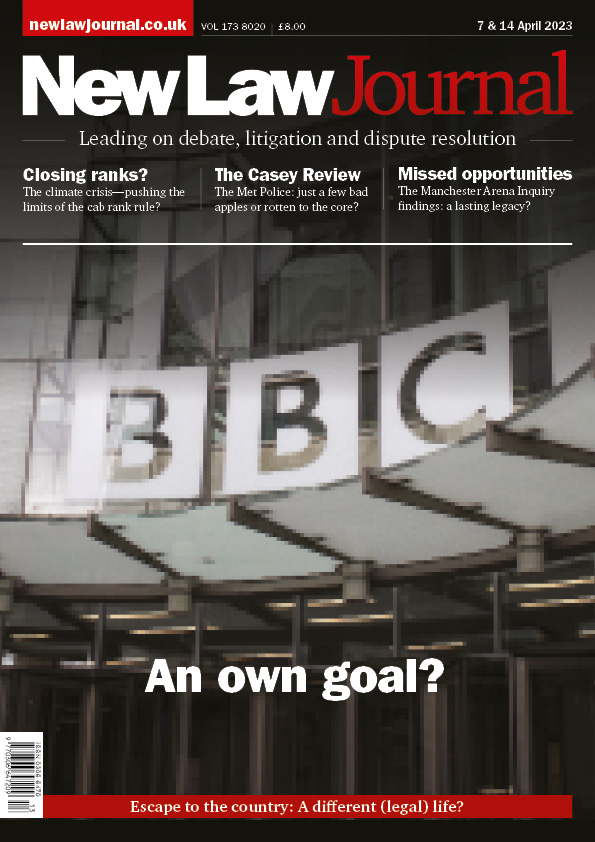THIS ISSUE

The Supreme Court has warned that those on the losing side of a political debate should not then resort to undermining legislation: David Walbank KC reports
Was the BBC’s handling of the Gary Lineker case about the perception of impartiality or of independence? John Gould puts the broadcaster’s guidelines under the microscope
Convention consensus: Christopher Deacon & Craig Evans weigh up claimant & defendant perspectives on the Hague Judgments Convention 2019
A diverse range of opportunities (and a convenient gap in the legal market) awaits those choosing a career as a paralegal, writes Amanda Hamilton
It’s not all about the City: from varied workloads to a much-improved work-life balance, Kate Stockdale extols the benefits of rural firms for junior lawyers
Liking, listening, learning & the law: Dr Emma Jones sets out the benefits of LawCare’s latest course on working with others
Intended parents opting for surrogacy could potentially become the legal parents at birth, under an overhaul of surrogacy laws recommended by the Law Commission and Scottish Law Commission.
Private family law children cases took an average of 47 weeks to conclude in the final quarter of 2022—up five weeks on the same period in 2021 and an all-time high, according to the latest family court statistics.
The government has launched Economic Crime Plan 2—a three-year public-private partnership plan to cut fraud, money laundering and sanctions evasion, tackle kleptocracy and recover more criminal assets.
MOVERS & SHAKERS

Freeths—Ruth Clare
National real estate team bolstered by partner hire in Manchester

Farrer & Co—Claire Gordon
Partner appointed head of family team

mfg Solicitors—Neil Harrison
Firm strengthens agriculture and rural affairs team with partner return
NEWS
Conveyancing lawyers have enjoyed a rapid win after campaigning against UK Finance’s decision to charge for access to the Mortgage Lenders’ Handbook
The Crown Prosecution Service (CPS) has launched a recruitment drive for talented early career and more senior barristers and solicitors
Regulators differed in the clarity and consistency of their post-Mazur advice and guidance, according to an interim report by the Legal Services Board (LSB)
The Solicitors Act 1974 may still underpin legal regulation, but its age is increasingly showing. Writing in NLJ this week, Victoria Morrison-Hughes of the Association of Costs Lawyers argues that the Act is ‘out of step with modern consumer law’ and actively deters fairness
A Competition Appeal Tribunal (CAT) ruling has reopened debate on the availability of ‘user damages’ in competition claims. Writing in NLJ this week, Edward Nyman of Hausfeld explains how the CAT allowed Dr Liza Lovdahl Gormsen’s alternative damages case against Meta to proceed, rejecting arguments that such damages are barred in competition law









